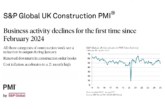
PBM’s Editor Paul Davies used his Viewpoint column in the magazine’s September edition to discuss the demise of the Government’s commitment to its zero carbon buildings policy and the effective end of the Green Deal:
After a day of record-breaking heat in many places on July 1st, the climate cooled rather considerably for the rest of the summer. And in a notionally ironic way, things turned colder still for all things sustainable building.
Firstly, in its ‘Fixing the foundations’ productivity report, the Government confirmed its intention not to proceed with the zero carbon buildings policy, which was initially announced in 2007. Consequently, as reported by the Chartered Institute of Building, “there will be no uplift to Part L of the Building Regulations during 2016 and both the 2016 zero carbon homes target and the 2019 target for non-domestic zero carbon buildings will be dropped, including the Allowable Solutions programme.”
Concern was expressed for continued investment in manufacturing and product development, whilst organisations such as the CIOB decried the “lack of ambition”. The Sustainable Energy Association went even further by proclaiming that consumers have been “condemned to higher bills” by scrapping the zero carbon policy. On the other hand, the Federation of Master Builders argued the decision to remove “unnecessary” zero carbon standards for new homes will boost the supply of housing through small and medium-sized house builders who had previously been “hit disproportionately hard by the rapid pace of change.”
Barely a fortnight later, the Department for Energy and Climate Change announced that funding was being stopped for the Green Deal, effectively killing the scheme in one fell swoop. Again, the industry bush telegraph came alive, yet there was minimal rancour over the death of an almost universally unpopular scheme.
“With the demise of Green Deal and the zero carbon policy alike, the onus falls onto the industry to fill the void; to channel its recent experiences and maintain the drive to improve standards. After all, despite the removal of targets and subsidies, the underlying issues remain unchanged.”
Comments such as the FMB’s “The Green Deal was the greatest flop of the last Parliament — it failed spectacularly in its mission to incentivise millions of house holders to improve the energy efficiency of their homes” and, from the Heating & Hot Water Industry Council, “This policy failed to engage with both installers and consumers and delivered little in terms of energy efficiency — its demise therefore is expected and understandable” were typical.
However, eyebrows were raised that the axe fell so swiftly — funding was brought to an immediate end — and especially that there was seemingly no thought as to any replacement.
Most commentators freely concede that the intention behind the Green Deal was noble, just that its implementation and execution were fundamentally flawed. It therefore follows that, in itself, the lack of alternative is no bad thing as there now exists an opportunity to develop something truly tangible and a more simple solution that can work within the existing supply chain — one ongoing criticism of the Green Deal was the complex additional framework that surrounded it.
With the demise of Green Deal and the zero carbon policy alike, the onus falls onto the industry to fill the void; to channel its recent experiences and maintain the drive to improve standards. After all, despite the removal of targets and subsidies, the underlying issues remain unchanged.
Indeed, for consumers and businesses, there remains a substantial appetite for the sustainable and energy efficient measures that can make their homes and premises — both new build and existing stock — more comfortable places in which to live and work, delivered with more manageable fuel bills.
To me, that sounds like an exciting, enticing and eminently achievable business opportunity. More schemes will inevitably come in, but let’s just remain in hope that Whitehall interference won’t terminally complicate things next time.









